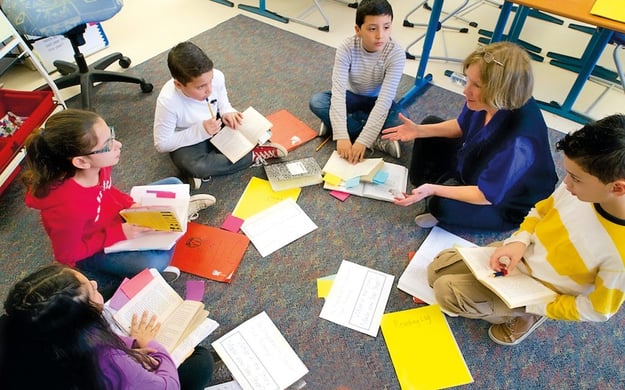 Studying and Thinking about Powerful Whole Group Instruction: Minilessons, Shared Reading, & Read Aloud K-3
Studying and Thinking about Powerful Whole Group Instruction: Minilessons, Shared Reading, & Read Aloud K-3
See below for a full transcript of the chat
Written by Anna Gratz Cockerille
One power of reading workshop is the way in which instruction can move seamlessly from whole-group, to small-group, to individual and back again in the span of a class period. Certainly, a reading teacher’s best chance of really moving kids further in their understanding is while working with small groups and individuals, where instruction can be differentiated to meet the needs of the each student. It is not as possible to meet every student’s needs during whole-group instruction. Inevitably, there will be students who are beyond or not quite at the level of whole-group lessons. But these lessons serve a very important purpose, nonetheless. They serve to rally students’ energy around a single, worthy cause. They serve to create classroom community-wide goals for reading and common language to talk about these goals. They serve to get students jazzed up about a new line of thinking, or a new trajectory in their path of work.
Of course, whole-group instruction is also an important source of well, instruction. In the lower grades, children benefit not only from whole-group read aloud and minilessons, but during shared reading as well, when a teacher leads the class in reading a text together. All of these serve to build students’ fluency, prosody, and comprehension, so important in the early grades.
Here are a few tips to ensure whole-group instruction goes best:
- Teach students systems for joining and exiting the meeting area as quickly and efficiently as possible.
- Organize students into partnerships, assign them places to sit, and clarify what they should bring with them each day.
- Keep the teaching short, fast-moving, and targeted. Focus on one, clear teaching point.
- Move through a predictable structure, so that students know what to expect.
- Observe to notice students who may need extra support. Make a plan to help them later, so as not to derail the lesson.
This week at the TCRWP Twitter chat, staff developers Samantha Barrett and Jessica Greiss will lead the community in chatting about powerful whole-group instruction in grades K-3. Join them, and bring your best questions and tips to participate in what is sure to be a lively discussion.
Each Wednesday night at 7:30pm eastern, The Teacher's College Reading and Writing Project hosts a Twitter chat using the hashtag #TCRWP. Join @MrsBarrett317 & @MrsJessToTheG tomorrow evening to chat about whole group instruction in grades K-3.
Not on Twitter? Take Heinemann’s free Twitter for Educators course here.
 Anna Gratz Cockerille, Coauthor of Bringing History to Life (Grade 4) in the Units of Study for Teaching Writing Series.
Anna Gratz Cockerille, Coauthor of Bringing History to Life (Grade 4) in the Units of Study for Teaching Writing Series.
Anna was a teacher and a literacy coach in New York City and in Sydney, Australia, and later became a Staff Developer and Writer at TCRWP. She served as an adjunct instructor in the Literacy Specialist Program at Teachers College, and taught at several TCRWP institutes, including the content literacy institute, where she helped participants bring strong literacy instruction into social studies classrooms. Anna also has been a researcher for Lucy Calkins, contributing especially to Pathways to the Common Core: Accelerating Achievement (Heinemann 2012), and Navigating Nonfiction in the Units of Study for Teaching Reading, Grades 3–5 series (Heinemann 2010). Most recently, Anna served as an editor for the Units of Study for Teaching Reading, K–5 series.


